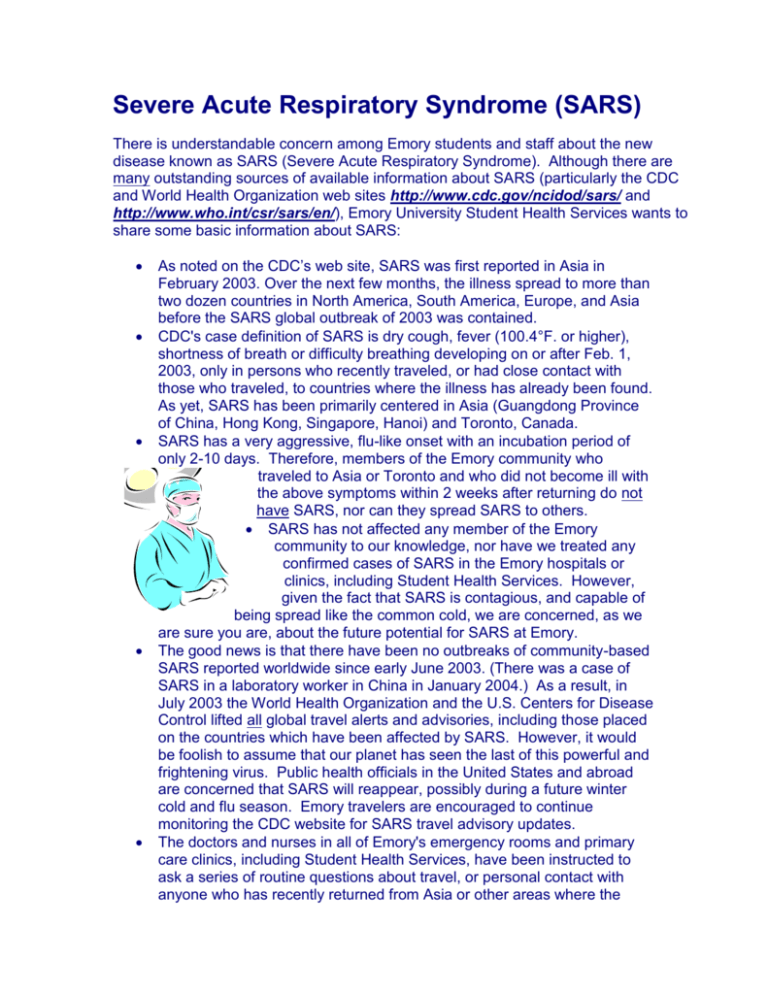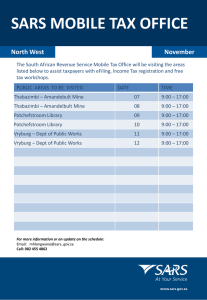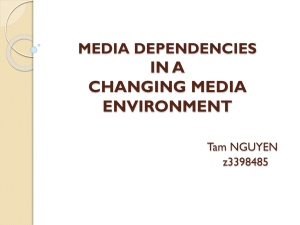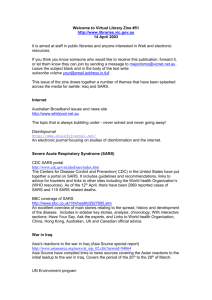SARS for Health Topics A-Z Final 2-04
advertisement

Severe Acute Respiratory Syndrome (SARS) There is understandable concern among Emory students and staff about the new disease known as SARS (Severe Acute Respiratory Syndrome). Although there are many outstanding sources of available information about SARS (particularly the CDC and World Health Organization web sites http://www.cdc.gov/ncidod/sars/ and http://www.who.int/csr/sars/en/), Emory University Student Health Services wants to share some basic information about SARS: As noted on the CDC’s web site, SARS was first reported in Asia in February 2003. Over the next few months, the illness spread to more than two dozen countries in North America, South America, Europe, and Asia before the SARS global outbreak of 2003 was contained. CDC's case definition of SARS is dry cough, fever (100.4°F. or higher), shortness of breath or difficulty breathing developing on or after Feb. 1, 2003, only in persons who recently traveled, or had close contact with those who traveled, to countries where the illness has already been found. As yet, SARS has been primarily centered in Asia (Guangdong Province of China, Hong Kong, Singapore, Hanoi) and Toronto, Canada. SARS has a very aggressive, flu-like onset with an incubation period of only 2-10 days. Therefore, members of the Emory community who traveled to Asia or Toronto and who did not become ill with the above symptoms within 2 weeks after returning do not have SARS, nor can they spread SARS to others. SARS has not affected any member of the Emory community to our knowledge, nor have we treated any confirmed cases of SARS in the Emory hospitals or clinics, including Student Health Services. However, given the fact that SARS is contagious, and capable of being spread like the common cold, we are concerned, as we are sure you are, about the future potential for SARS at Emory. The good news is that there have been no outbreaks of community-based SARS reported worldwide since early June 2003. (There was a case of SARS in a laboratory worker in China in January 2004.) As a result, in July 2003 the World Health Organization and the U.S. Centers for Disease Control lifted all global travel alerts and advisories, including those placed on the countries which have been affected by SARS. However, it would be foolish to assume that our planet has seen the last of this powerful and frightening virus. Public health officials in the United States and abroad are concerned that SARS will reappear, possibly during a future winter cold and flu season. Emory travelers are encouraged to continue monitoring the CDC website for SARS travel advisory updates. The doctors and nurses in all of Emory's emergency rooms and primary care clinics, including Student Health Services, have been instructed to ask a series of routine questions about travel, or personal contact with anyone who has recently returned from Asia or other areas where the disease has occurred, whenever persons present with SARS-like symptoms (fever, cough, shortness of breath, etc.). These questions are simple and straightforward: o Do you have a fever of 100.4F (or 38C) and a cough? AND o Have you traveled during the past 14 days to Asia (China, Hong Kong, Taiwan, Singapore, Vietnam or Thailand) or Canada (especially Toronto)? Or o Have you had close exposure during the past 14 days to a person with known or suspected SARS? If the answers are “yes,” Emory healthcare workers will approach the ill student as a suspected SARS case until qualified healthcare officials have proven otherwise. If you are an Emory student and you are concerned that you (or a friend) may have SARS, immediately call Student Health Services (404-7277551). During office hours, ask to speak to one of our physicians or medical providers. After hours, page the on-call Student Health physician (same number, select option 0) or call Emory University Hospital Emergency Department (404-712-7100). Inform the receptionist or operator that you are an ill student with possible SARS. Ask to speak to the attending or on-call physician. o Follow the instructions of the attending physician regarding going a healthcare facility. FYI, it is likely that a student ill with possible SARS will be taken to the Emory University Hospital Emergency Department, where they have special infection isolation rooms, xray facilities and immediate laboratory availability. o In order to ensure that there has not been a breakdown in communication, inform any transporting medical personnel (Emory First Responders, Student Health personnel, etc.) that you (or the ill student) are/is a possible SARS patient, so that respiratory and advanced infectious disease precautions (masks, gowns, etc.) can be taken prior to contact with the patient. Of course, SARS is by no means the only illness that should concern international travelers. All student travelers should take advantage of the indispensable services offered by the Emory University Student Health Services Travel Clinic (for appointments, please call 404-727-7551). An appointment at the Travel Clinic to check one's immunization record and country-specific recommendations should be a key item on every international student traveler's checklist. Once again, excellent, up-to-date and reliable information about SARS can be found at the CDC and World Health Organization web sites: http://www.cdc.gov/ncidod/sars/ http://www.who.int/csr/sars/en/ Michael J. Huey, MD, February 2004




